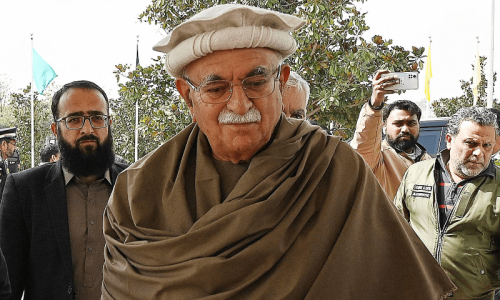THE contradiction is intriguing. It is a story of a woman of royal lineage who passed away recently and will be remembered fondly for her services to the poor. Her work should be seen in the context of ‘social security’. That is what made ‘Rajkumari’ Kaniz Sakina Wajid Khan (1920-2021) exceptional.
It was not charity she was doling out, as social work is often considered to imply today, but a service she saw herself providing to the indigent. It additionally had the underpinnings of old-time values.
The daughter of Raja Syed Sajjad Hussain of taluqdari Kotwara in Awadh, Kaniz had already made her choice of professional life when Pakistan was born in 1947. In 1939, Kaniz Wajid Khan (as she came to be known after her marriage) was appointed head of the Indian Red Cross Committee to help the war affectees.
Details of her “interesting life” in a narrative by H.M. Naqvi in the Friday Times gave me a new insight into a woman who moved with the times but never abandoned her ethos and compassion for the less privileged.
Social work became an intrinsic part of Kaniz’s being.
Kaniz Wajid is generally described as a social worker. In the early years of Pakistan, Begum Ra’ana Liaquat Ali Khan mobilised educated women — there were not many at that time — to play a positive role in society. And they responded. With her Red Cross experience, Kaniz proved to be an asset. She took to social work as a fish takes to water.
Social work became an intrinsic part of Kaniz’s being. She skilfully involved her family in her activities. Her daughter, Shahrbano, tells me how her mother got her teenage brother and his friends to paint the walls of the residential quarters for junior officers. She was supervising the construction. Running short of funds as the cash-starved government of the day could only plan projects on shoestring budgets she had no option but to devise economy measures.
Until she joined the Social Welfare Department of the government in 1964 her work was honorary. What distinguished it though was its concept of being a service to the people, one that blended with humanism and dignity. These traits were acquired in her childhood at the missionary school she attended in Mussourie where she was sent by the Court of Wards when she was orphaned at the age of five.
Her legacies are numerous and diverse and they have all made an impact. Be it the SOS Village Karachi, the Utility Stores, vocational training centres, health programmes for mother and child, they all became models in their field.
After retiring from the government in 1980, Kaniz joined the Education Trust Nasra Schools, and remained associated with it for life. Founded by her friend Nasra Wazir Ali in 1949 to provide good-quality education to the children of low-income families, the school was a cause that was close to Kaniz’s heart. Here she went on to play the role she knew best. She upscaled and expanded the school. Mrs Wazir Ali devoted her time and energy to the administrative and academic side. Kaniz was always on the go in the small car that she drove herself to scout for land, raise funds and supervise construction even in the hot summer months. The school now has five campuses in Karachi.
Education did not mean blackboard and chalk alone for Kaniz. It was also a way to impart good values — integrity, truth and compassion — that her generation cherished. Students should grow up to be good humans.
A young man I know who studied at the Trust school recalls how Kaniz Wajid, who had always lived on campus until recently when she moved to her daughter’s home, would casually stroll down the grounds and play table tennis with the children. “She treated us with dignity and talked with us with utmost politeness on all issues under the sun. It was her way of mentoring us,” he recalls.
Kaniz Wajid always welcomed me when I visited her whether at her neat living quarters at the Korangi campus or at Shahrbano’s home. She was always at ease wherever she was. We discussed issues that pertained to education and her main concern was that education was going far beyond the reach of the poor. But she never gave up her courteous ways. When I visited her shortly before the Covid lockdown was imposed, I took along a book for her. She was sitting and reading the newspaper in bed. She was then a few months short of her 100th birthday. Her mind was as alert and her interest in life as alive as ever. A few days later, Shahrbano called to say, “Mummy has asked me to tell you how much she enjoyed your book.” This was a typically Kanizian gesture.
I write this to celebrate the life of a woman who believed in the dignity of human beings and the values that were enshrined in our education once upon a time. RIP dear Kaniz Wajid Khan.
Published in Dawn, September 10th, 2021













































